#ITSM IT Service Management
Explore tagged Tumblr posts
Text
The Future of IT Operations with ITSM IT Service Management
The world of IT is evolving at a breakneck pace. As businesses rely more heavily on technology to drive performance, customer engagement, and innovation, the pressure on IT departments to deliver seamless, efficient, and secure services is growing. In this dynamic landscape, ITSM IT Service Management is emerging as a critical pillar for shaping the future of IT operations.
From traditional service desks to intelligent, AI-powered support systems, ITSM is no longer just about fixing broken systems—it’s about aligning IT with strategic business goals, optimizing resources, and delivering value at every touchpoint. So, what does the future of IT operations look like with ITSM IT Service Management at its core?

Shifting from Reactive to Proactive IT
Historically, IT operations have functioned in a reactive mode—waiting for issues to arise before resolving them. However, with the rise of ITSM IT Service Management, that approach is quickly becoming outdated. Modern ITSM tools are enabling predictive analysis, early-warning systems, and automation that help IT teams prevent problems before they impact end-users.
By integrating AI and machine learning, ITSM platforms can now analyze patterns in incidents, system behavior, and user reports to forecast outages, security breaches, or performance bottlenecks. This proactive approach drastically reduces downtime and enhances overall system reliability.
Integration with AI and Automation
Artificial intelligence is not just a buzzword in the world of IT anymore. It’s a reality that’s changing how service management is approached. In the future, ITSM IT Service Management will be deeply integrated with AI capabilities that handle ticket routing, automatic categorization, and even real-time resolution of common issues.
Chatbots and virtual agents are already replacing first-level support in many organizations, providing immediate answers to routine queries and freeing up human agents for more complex tasks. Automation will also handle tasks like software updates, server reboots, and user provisioning—accelerating operations while reducing the chance for error.
Emphasis on User Experience
The success of IT operations is no longer measured only by uptime or issue resolution time. In the coming years, user experience will become a core focus of ITSM IT Service Management. End-users expect fast, frictionless support whether they are logging in from a remote location or requesting a new application on-site.
To meet this demand, ITSM platforms are evolving to include self-service portals, knowledge bases, and mobile-friendly interfaces that empower users to resolve minor issues on their own. This shift not only improves satisfaction but also reduces the burden on IT help desks.
Agile and DevOps Integration
The future of IT is agile, and ITSM IT Service Management is adapting to support that agility. As organizations adopt DevOps practices to shorten development cycles and deliver software faster, ITSM must become more flexible and responsive.
ITSM processes are being reimagined to support continuous integration, continuous delivery (CI/CD), and rapid change management. The goal is to maintain governance and control while enabling fast-paced innovation—a delicate balance that future-ready ITSM frameworks are designed to support.
Data-Driven Decision Making
As IT operations become more complex, the role of data is becoming increasingly important. ITSM IT Service Management platforms of the future will provide robust analytics and reporting capabilities, enabling IT leaders to make smarter decisions based on real-time insights.
These insights will help in identifying trends, tracking SLA compliance, monitoring resource utilization, and measuring user satisfaction. With access to the right data, businesses can continuously improve their IT services and align them better with strategic goals.

Security and Compliance Focus
Cybersecurity threats are on the rise, and compliance requirements are becoming more stringent. The next generation of ITSM IT Service Management will play a key role in ensuring IT environments remain secure and compliant. Features like automated patch management, audit trails, role-based access control, and incident response tracking will become standard.
By integrating security protocols directly into the service management workflows, organizations can respond quickly to threats and maintain compliance with industry standards and government regulations.
The Role of Trusted Partners
As ITSM becomes more complex and essential, working with a knowledgeable and experienced service provider becomes critical. Companies like Olatech Solutions are leading the way by offering tailored ITSM solutions that combine advanced technology with real-world expertise. Whether it’s implementing a new platform, integrating automation tools, or training internal teams, having a reliable partner can make all the difference in future-proofing IT operations.
Conclusion
The future of IT operations is smarter, faster, and more user-centric—and ITSM IT Service Management is the foundation that supports this transformation. From AI-driven automation and predictive analytics to improved user experience and tighter security, ITSM is evolving to meet the demands of modern business environments. For organizations ready to embrace these changes, the future holds enormous potential for growth, innovation, and operational excellence.
0 notes
Text
Service Management Solutions That Make You Look Good.
Sanjay Kumar Mohindroo Sanjay Kumar Mohindroo. skm.stayingalive.in Discover how service management solutions can elevate your leadership, enhance productivity, and drive business success. The Power of Service Management Solutions In today’s fast-paced and dynamic business environment, #ServiceManagementSolutions are more than just tools—they are strategic enablers that can elevate your…
#AI in service management#business productivity#digital transformation#enterprise service management#ITSM#leadership in technology#News#Operational Efficiency#Sanjay Kumar Mohindroo#service automation#service management#strategic KPIs
2 notes
·
View notes
Text
DevOps + ITSM = Balance in Motion
Can speed and stability coexist in IT operations? We dove into how DevOps and ITSM can actually complement each other - instead of clashing.

Forget the old debates. Learn how to align automation with process, change with control.
👉 Full read here: https://www.advisedskills.com/blog/it-service-management/devops-and-itsm-how-to-align-speed-with-stability-in-it-operations
#devops#itsm#devops culture#digital ops#it service management#service management software#advised skills
1 note
·
View note
Text
The Impact of AI on IT Service Management (ITSM)

The rise of Artificial Intelligence (AI) is revolutionizing IT Service Management (ITSM), shifting from traditional reactive support models to proactive, predictive, and automated IT operations. Businesses today demand faster resolutions, reduced downtime, and intelligent automation, and AI is at the forefront of these transformations.
AI-powered ITSM enhances operational efficiency through self-healing IT support, predictive analytics, automated workflows, and AI-driven cybersecurity. AI virtual agents and self-service portals significantly cut IT support ticket volumes, while AI-powered asset and configuration management ensures optimized IT infrastructure.
Leading enterprises are already leveraging AI-driven ITSM solutions like ServiceNow Predictive Intelligence, BMC Helix ITSM, and IBM Watson AI to streamline ticketing, automate decision-making, and boost security compliance. Industries such as banking, healthcare, retail, manufacturing, and telecommunications are seeing significant benefits, from fraud detection to predictive maintenance.
However, AI-driven ITSM also comes with challenges, including data privacy concerns, resistance to automation, and the need for continuous AI training. Overcoming these hurdles requires organizations to strategically implement AI in phases, ensuring compliance with regulatory standards and continuously monitoring AI performance for optimization.
The future of AI in ITSM points toward hyperautomation, AI-driven IT governance, and advanced conversational AI for IT support. Businesses that integrate AI into their ITSM strategies will gain a competitive advantage by reducing costs, enhancing service quality, and strengthening cybersecurity.
For more details, click on the link to explore the full article. — Appson Technologies.
0 notes
Text
Optimize Operations with Comprehensive IT Asset Management Solutions (ITAM)
Discover top IT asset management tools and solutions to streamline operations. Optimize your IT infrastructure with advanced strategies.

0 notes
Text

How can Managed ServiceNow Services from a ServiceNow Partner increase efficiency. Are organizations leveraging the expertise of ServiceNow to streamline operations, reduce costs, and enhance overall efficiency, ultimately driving better business outcomes? www.mergenit.com
#digital transformation#servicenow#managed it services#itsm#mergenit#ServiceNow Expert#efficiency#productivityboost
0 notes
Text
Unlocking Business Efficiency with IT Service Management Consulting
In today's fast-paced digital world, managing IT services efficiently is crucial for the success of any business. IT Service Management (ITSM) plays a pivotal role in ensuring that IT services align with the business's needs and goals. Effective ITSM practices not only enhance service quality but also drive business growth by optimizing IT operations, reducing costs, and improving customer satisfaction. This is where IT service management consulting comes into play.
Understanding IT Service Management Consulting
IT service management consulting involves working with experts who help businesses optimize their IT service delivery and management processes. These consultants provide insights and strategies to improve IT services' effectiveness and efficiency, ensuring they support the organization's overall goals. By leveraging their expertise, businesses can streamline their IT processes, enhance service delivery, and ensure compliance with industry standards and regulations.
The Importance of Service Management Consulting
Service management consulting is essential for businesses looking to improve their IT service management practices. Consultants bring a wealth of experience and knowledge, enabling organizations to identify areas for improvement and implement best practices. They help businesses:
Optimize IT Operations: Service management consultants analyze existing IT processes and recommend improvements to enhance efficiency and reduce operational costs.
Improve Service Quality: By implementing industry best practices, consultants help businesses improve the quality of their IT services, leading to higher customer satisfaction and retention.
Ensure Compliance: Consultants ensure that IT services comply with industry standards and regulations, reducing the risk of non-compliance and associated penalties.
ITSM Services: Enhancing Business Value
ITSM services encompass a wide range of activities designed to manage and deliver IT services effectively. These services include:
Incident Management: Managing and resolving IT incidents to minimize service disruption.
Problem Management: Identifying and addressing the root causes of recurring incidents to prevent future issues.
Change Management: Implementing changes in the IT environment efficiently while minimizing risks.
Service Request Management: Handling user requests for new services or support.
Service Level Management: Monitoring and managing service performance to meet agreed-upon service levels.
By leveraging ITSM services, businesses can improve service delivery, reduce downtime, and enhance customer satisfaction. At MicroGenesis, we offer a comprehensive suite of ITSM services tailored to meet the unique needs of your organization. Our expert team helps you implement best practices and optimize your IT service management processes.
Choosing the Right IT Service Management Software
Selecting the right IT service management software is crucial for effective ITSM implementation. The software should support the organization's specific needs and integrate seamlessly with existing systems. Key features to look for in ITSM software include:
Incident and Problem Management: Efficiently manage incidents and problems to minimize downtime.
Change Management: Ensure smooth implementation of changes with minimal impact on services.
Service Request Management: Streamline the handling of service requests.
Configuration Management: Maintain accurate records of IT assets and their relationships.
Service Level Management: Monitor and manage service performance to meet customer expectations.
At MicroGenesis, we offer a range of IT service management solutions to help you choose the right software for your business. Our solutions are designed to improve service delivery, enhance efficiency, and support your business objectives.
Conclusion
In today's digital era, effective IT service management is more critical than ever. By leveraging IT service management consulting, ITSM services, and the right ITSM software, businesses can optimize their IT operations, improve service quality, and achieve their business goals. At MicroGenesis, we are committed to helping businesses succeed with our comprehensive ITSM services and solutions. As a digital transformation company, we provide end-to-end support to ensure your IT services are aligned with your business needs and drive success.
Discover how MicroGenesis can transform your IT service management and take your business to new heights. Contact us today to learn more about our ITSM consulting services and solutions.
#itsm solutions#it service management company#itsm software#itsm company#it service management companies
0 notes
Text
Maximize Efficiency with Professional ServiceNow Advisory and Managed Services
The busy world of today has made to observe it first hand the cost side in business: Efficiency is not a goal but necessity. Enterprise are always aiming at operational efficiencies, reduction in costs and enhancement of consumer services. A solution like the ServiceNow, an IT service management (ITSM) platform designed for this purpose can handle everything related to these queueing scenarios and more. But ServiceNow often requires the help of professional advisors and managed services experts for businesses to really maximize its potential. Then they make sure that the platform is used and implemented as intended, plus continuous improvement aligned with business goals.
Understanding ServiceNow and Its Potential
ServiceNow is more than just an ITSM tool; it’s a versatile platform that supports a wide range of IT operations, customer service, HR service delivery, and even security operations. By integrating these functions into a single platform, ServiceNow helps organizations automate processes, manage incidents, and improve overall service efficiency. However, the breadth and depth of ServiceNow’s capabilities can be overwhelming, particularly for businesses without dedicated ITSM expertise.
The Role of ServiceNow Advisory Services
Today, Business domain advisory services are rapidly gaining acceptance amongst businesses to guide their intricate use of the ServiceNow platform. This includes expert advice on how to utilise ServiceNow effectively for your specific business requirement. "ServiceNow advisory services ensure that companies new to ServiceNow or looking for additional guidance on optimization have a clear path ahead."
Advisory services typically start with a comprehensive assessment of the current IT environment and business objectives. This helps in identifying gaps, inefficiencies, and opportunities for improvement. Based on this assessment, a tailored strategy is developed, outlining the best approach to implement or enhance ServiceNow capabilities. The goal is to align the platform with the organization’s strategic objectives, ensuring that every aspect of ServiceNow is optimized for maximum efficiency.
Key Benefits of ServiceNow Advisory Services
1. Trusted Consult and Expert Guidance :
An experts view of ServiceNow will give an upper hand to enterprises as it always can offer industry best practice advice which in house team may miss providing right solution, this becomes very important when deciding on how the platform should be deployed, used.
2. Tailored solutions:
Advisory services provides pecialised strategies that are tailor-maid which suites your business needs. This will guarantee that you are not copying a pattern but your pattern is well set for your conditions.
3. Mitigated Risks:
Advisory services also mitigate risks of things going wrong half way through the process, which may become a huge time turnaround and throw ServiceNow implementation or optimization completely out.
4. Manifestaigned Time-to-Value:
By defining a strategy and the help from an expert, businesses can implement ServiceNow quickly so they are able to enjoy such platform advantages sooner.
Managed Services: Sustaining Efficiency Over Time
Advisory services are invaluable for getting ServiceNow up and running properly, but managed services ideally facilitate the continuous improvement of your platform over time. Managed services delivers ongoing support, ensuring ServiceNow continues to deliver value as business needs change.
ServiceNow Managed Services Building Blocks
1. Ongoing monitoring and support:
With managed service, the ServiceNow ecosystem will be continuously monitored 24/7 to quickly detect any potential problems. This proactive approach reduces downtime and keeps the platform well-tuned.
2. Continuous Updates and Maintenance:
ServiceNow will need continuous and timely updates in the form of new features. Managed Services – Always leverage the latest platform capabilities with this turnkey solution, designed to allow a faster and more secure transfer of solutions across updates.
3. Performance Fine Tuning:
As business processes evolve, it is critical to continually tweak ServiceNow configurations so that the system performs at its peak. It brings the level of expertise necessary to continuously tune and enhance platform performance.
4. End-User Training and Support:
In order to get the most value out of ServiceNow, end-users should be able to easily use it. Finally, managed services would in most cases come with a training offering to help staff make the best use of ServiceNow features which would encourage adoption and improved efficiency.
5. Scalability and flexibility :
As your business scales, so might your ServiceNow requirements. Because managed services enable the platform to easily scale in or out, you can quickly adapt it your needs without of an interruption.
Why Professional Services Are Essential for Maximizing Efficiency
Implementing and managing ServiceNow without professional assistance can be challenging. The platform’s complexity means that businesses may struggle to fully utilize its features, leading to suboptimal performance and missed opportunities. Professional ServiceNow advisory and managed services bridge this gap by providing the expertise needed to harness the full potential of the platform.
Efficiency Gains Through Professional Services
1. Operating Efficiently:
Professional services can design ServiceNow to do more of the work for you. Ensuring automated workflows that remove time consuming manual touches and reduce human errors
2. Extremely Low Implementation Costs:
The full value of ServiceNow implementation can be enjoyed at a much lower price than traditional outsourcing.
3. Better Synergy:
With expert guidance and specialized training, ServiceNow can be used across the organization to deliver services more effectively resulting in increased customer satisfaction evidence from excellent business outcomes.
4. This means that professional services will make certain your ServiceNow can be aligned with the overall business strategy, making it a tool for strategic purposes of long term goals rather than just an operational IT solution
Conclusion: Unlock the Full Potential of ServiceNow
ServiceNow is a powerful platform with the potential to revolutionize how businesses operate. However, to fully unlock this potential, professional ServiceNow advisory and managed services are essential. These services provide the expertise needed to implement, optimize, and maintain ServiceNow, ensuring that the platform delivers maximum efficiency and value over time.
By investing in professional services, businesses can not only improve their current operations but also position themselves for future success. The combination of expert guidance, tailored solutions, and ongoing support ensures that ServiceNow remains a strategic asset that drives growth and efficiency.
FAQs
1. What is the difference between ServiceNow advisory and managed services?
ServiceNow advisory services focus on strategic guidance and implementation planning, while managed services provide ongoing support and maintenance to ensure continuous platform optimization.
2. How can ServiceNow managed services improve my business operations?
Managed services ensure that ServiceNow is continuously monitored, updated, and optimized, leading to improved efficiency, reduced downtime, and better alignment with business objectives.
3. Why should I invest in professional ServiceNow services?
Professional services provide the expertise and support needed to fully leverage ServiceNow’s capabilities, ensuring that the platform delivers maximum value and efficiency.
4. Can ServiceNow be customized for my specific business needs?
Yes, ServiceNow is highly customizable. Advisory services can help tailor the platform to meet your specific business requirements, ensuring a perfect fit.
5. How do I choose the right ServiceNow service provider?
Look for providers with a proven track record, industry expertise, and a comprehensive range of services that align with your business needs. Consulting reviews and case studies can also help in making an informed decision.
0 notes
Text
🔍 How Automation is Reshaping Service Level Management
Is your IT team struggling to meet SLAs? Automation can be the key to optimizing Service Level Management. From AI-powered monitoring to automated incident resolution, discover how technology is transforming IT service performance.

Click here to explore the full article: https://www.advisedskills.com/blog/it-service-management/the-role-of-automation-in-service-level-management
#ITSM #Automation #ServiceManagement #AI
1 note
·
View note
Text
L&T Technology Services and SymphonyAI collaborate for AI-based Business Transformation.

Bengaluru: L&T Technology Services, a digital engineering and R&D company, and SymphonyAI, a predictive and generative AI SaaS product provider, have announced a partnership to provide transformative AI operations to enterprises worldwide.
ALSO READ MORE- https://apacnewsnetwork.com/2024/07/lt-technology-services-and-symphonyai-collaborate-for-ai-based-business-transformation/
#Business Transformation#generative AI SaaS product provider#ITSM system#L&T Technology Services#SymphonyAI#SymphonyAI Apex Service Management#transformative AI operations
0 notes
Text
Utilizing ServiceNow ITSM to Revolutionize Organizations
ServiceNow ITSM (Information Technology Service Management) is a collection of activities and tools for designing, delivering, and managing IT services in an effective manner. ITSM is used to manage issues, service requests, problems, and modifications, which are often connected via an ITSM platform such as ServiceNow. ServiceNow ITSM transforms how businesses manage their IT services by combining a variety of tools and features into a unified cloud-based platform.
In the rapidly changing technological world, companies that want to sustain flawless operations and top-notch service delivery must prioritize effective IT service management or ITSM. A powerful cloud-based platform called ServiceNow ITSM has come to light as a game-changer, completely altering the way companies handle their IT services. All things considered, ServiceNow ITSM's flexibility and wide range of features enable companies in a variety of industries, to improve productivity, legal compliance, and customer happiness while permitting creativity and scaling in a constantly changing digital environment.
Important ServiceNow ITSM Functionalities:
Incident Management: Enables effective event reporting, tracking, and resolution to reduce service interruptions. It prioritizes events depending on their severity and urgency, ensuring that they are resolved as soon as possible.
Problem Management: Looks at the fundamental cause of reoccurring problems in order to prevent them from happening again. It focuses on finding underlying problems and putting long-term solutions in place.
Change Management: Allows for the controlled introduction of changes to IT infrastructure, reducing the risk of interruption. It guarantees that processes for organizing, authorizing, and executing changes are uniform.
Configuration Management Database (CMDB): A consolidated store of information on configuration items (CIs), relationships, and relationships that assist in timely choice-making and controlling changes.
Workflows and automation: Workflows automate routine tasks and procedures, eliminating manual involvement and maximizing efficiency throughout IT operations.
ServiceNow ITSM Key Takeaways:
ServiceNow ITSM's various uses across sectors demonstrate its versatility and revolutionary power:
Productivity and Output: ServiceNow ITSM improves efficiency and productivity through automated workflows and simplifying IT operations, freeing up enterprises to concentrate on their main goals.
User Experience: Improved client fulfillment is critical in all businesses, and it is a result of improved incident response and execution of services.
Prevention of Risks and Conformity: The platform's extensive features help to protect data and operations by reducing risks and guaranteeing adherence to industry-specific requirements.
Invention and Agility: The adaptability and flexibility of ITSM to changing company requirements promote innovation and expansion.
Conclusion
ServiceNow ITSM is a disruptive force that caters to a wide range of industrial demands by changing IT service delivery. Its creative use cases highlight the platform's adaptability and potential to enhance efficiency, enhance service quality, and help enterprises survive in an ever-more digital and competitive market. ServiceNow ITSM is a backbone for success as organizations develop, enabling firms to handle technology obstacles while providing great services to their customers. For More Details And Blogs : Aelum Consulting Blogs
For ServiceNow Implementations and ServiceNow Consulting Visit our website: https://aelumconsulting.com/servicenow/
1 note
·
View note
Text

Explore the ITSM Maturity Curve and take your enterprise to new heights. Discover key insights and strategies to optimize your IT service management. Don't miss out – dive into the details now for a smarter, more efficient organization. Click here to read the article: ITSM
0 notes
Text
2024 team sponsors recap!
this is completely irrelevant to F1 but i study and do these stuffs for a living sooo 😩😩 2023 sponsors are based on the sponsors that are there at the beginning of the season (new sponsors that join in the middle of the season will be classified as 2024's)
Mercedes AMG Petronas F1 Team:
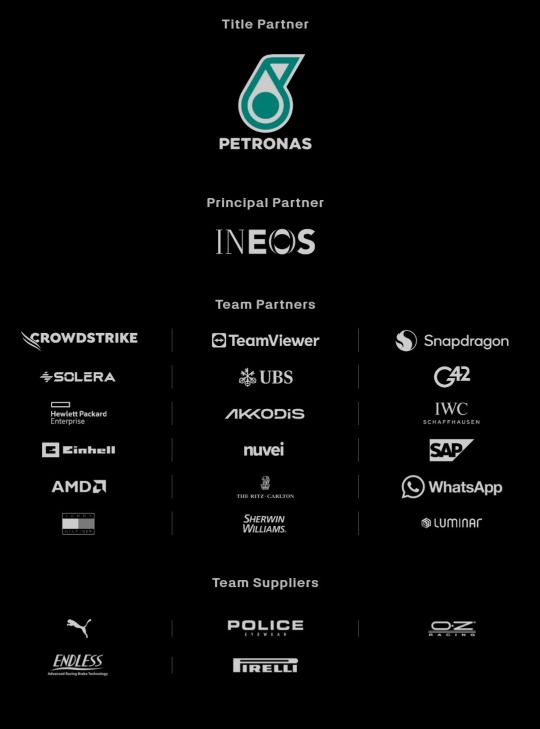
New sponsors: Whatsapp, Luminar (American tech company), SAP (German software company), nuvei (Canadian credit card services), Sherwin Williams (American painting company) 2024 data last update: 2024/02/14
Old sponsors that left: Monster Energy, Pure Storage (American technology company), fastly (American cloud computing services), Axalta (American painting company), Eight sleep (American mattresses company) 2023 data last update: 2023/01/07
Oracle Red Bull Racing F1 Team:
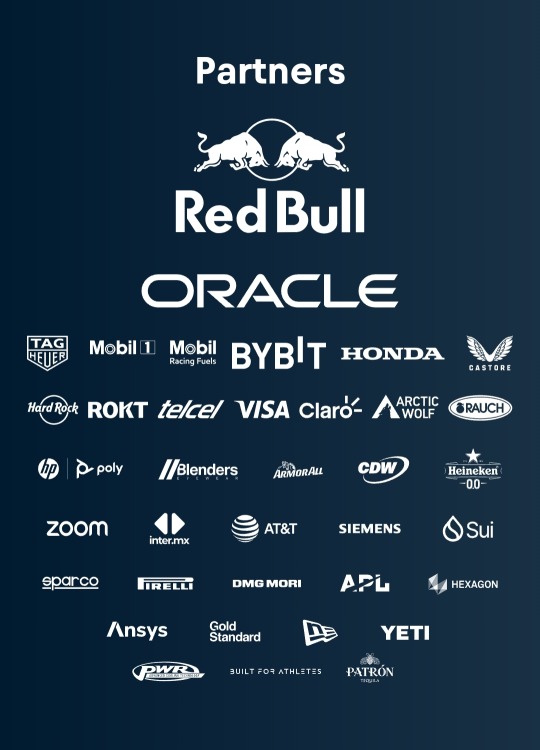
New sponsors: Yeti (American cooler manufacturer, joined later in 2023), APL (American footwear/athletic apparel manufacturer, joined later in 2023), CDW (American IT company, joined later in 2023), Sui (American tech app by Mysten Labs, joined later in 2023), Patron Tequila (Mexican alcoholic beverages company, joined later in 2023) 2024 data last update: 2024/02/15
Old sponsors that left: CashApp, Walmart, Therabody (American wellness technology company), Ocean Bottle (Norwegian reusable bottle manufacturer), PokerStars (Costa Rican gambling site), Alpha Tauri (? no info if they're official partners or not but Austrian clothing company made by Red Bull), BMC (Switzerland bicycle/cycling manufacturer), Esso (American fuel company, subsidiary of ExxonMobil), Hewlett Packard Enterprise (American technology company) 2023 data last update: 2023/03/07
More: Esso is a subsidiary of Mobil so there's possibility they merged or something
Scuderia Ferrari:
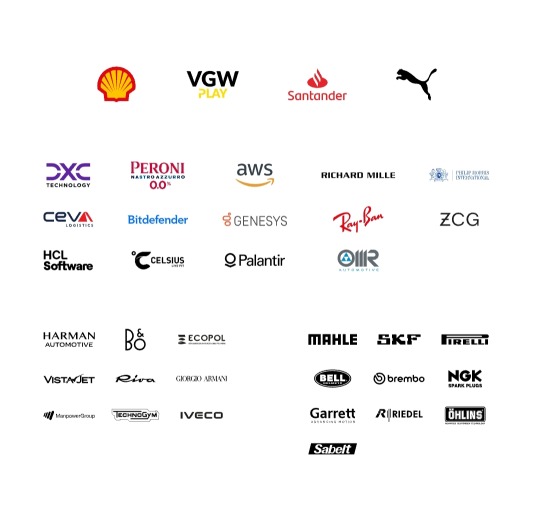
New sponsors: VGW Play (Australian tech game company, joined later in 2023), DXC Technology (American IT company, joined later in 2023), Peroni (Italian brewing company), Z Capital Group/ZCG (American private asset management/merchant bank company), Celsius (Swedish energy drink manufacturer) 2024 data last update: 2024/02/15
Old sponsors that left: Mission Winnow (American content lab by Phillip Morris International aka Marlboro), Estrella Garcia (Spanish alcoholic beverages manufacturer), Frecciarossa (Italian high speed train company) 2023 data last update: 2023/02/16
More: Mission Winnow is a part of Phillip Morris International. They are no longer listed as team sponsor but PMI is listed instead.
(starting here, 2023 data last update is 2023/02/23 and 2024 data last update is 2024/02/15)
McLaren F1 Team: (Only McLaren RACING's data is available idk if some of these are XE/FE team partners but anw..)
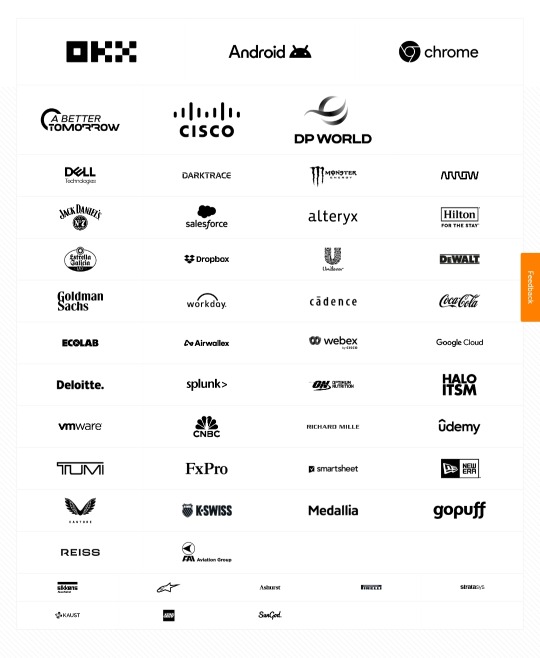
New sponsors: Monster Energy, Salesforce (American cloud based software company, joined later in 2023), Estrella Garcia (Spanish alcoholic beverages manufacturer), Dropbox (American file hosting company), Workday (American system software company, joined later in 2023), Ecolab (American water purification/hygiene company), Airwallex (Australian financial tech company), Optimum Nutrition (American nutritional supplement manufacturer), Halo ITSM (American software company, joined later in 2023), Udemy (American educational tech company, joined later in 2023), New Era (American cap manufacturer, joined in 2023), K-Swiss (American shoes manufacturer, joined later in 2023), Alpinestars (Italian motorsports safety equipment manufacturer)
Old sponsors that left: DP World (Emirati logistics company), EasyPost (American shipping API company), Immersive Labs (UK cybersecurity training company?), Logitech, Mind (UK mental health charity), PartyCasino (UK? online casino site), PartyPoker (American? gambling site), Sparco (Italian auto part & accessory manufacturer), Tezos (Switzerland crypto company)
Aston Martin Aramco F1 Team:

New sponsors: Valvoline (American retail automotives service company, joined later in 2023), NexGen (Canadian sustainable? fuel company), Banco Master (Brazilian digital banking platform, joined later in 2023), ServiceNow (American software company, joined later in 2023), Regent Seven Seas Cruise, Wolfgang Puck (Austrian-American chef and restaurant owner, joined later in 2023), Financial Times (British business newspaper), OMP (Italian racing safety equipment manufacturer), stichd (Netherlands fashion & apparel manufacturer)
Old sponsors that left: Alpinestars (Italian motorsports safety equipment manufacturer), crypto.com (Singaporean cryptocurrency company), ebb3 (UK? software company), Pelmark (UK fashion and apparel manufacturer), Peroni (Italian brewing company), Porto Seguro (Brazilian insurance company), Socios (Malta's blockchain-based platform), XP (Brazilian investment company)
Stake F1 Team (prev. Alfa Romeo):
???? Can't found their website (might be geoblocked in my country???)
BWT Alpine F1 Team:
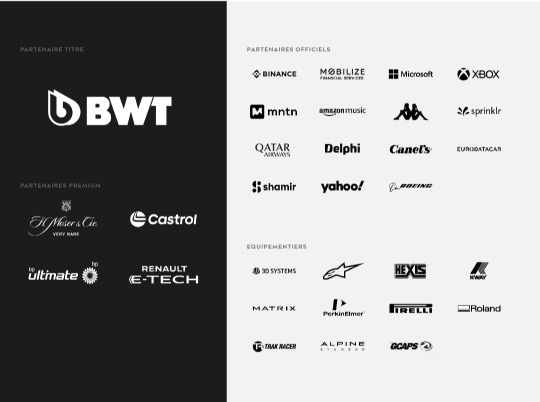
New sponsors: MNTN (American software company), H. Moser & Cie (Switzerland watch manufacturer), Amazon Music
Old sponsors that left: Bell & Ross (French watch company), Ecowatt (??? afaik French less-energy smthn smthn company), Elysium (French? American? Software company), KX (UK software company), Plug (American electrical equipment manufacturing company)
Visa CashApp RB F1 Team (prev. Scuderia Alpha Tauri):

New Sponsors: Visa, CashApp, Hugo Boss, Tudor, Neft Vodka (Austrian alcoholic beverages company), Piquadro (Italian luxury bag manufacturer)
Old sponsors that left: Buzz (?), Carl Friedrik (UK travel goods manufacturer), Flex Box (Hongkong? shipping containers manufacturer), GMG (Emirati global wellbeing company), RapidAPI (American API company)
Haas F1 Team:

New sponsors: New Era (American cap manufacturer, joined later in 2023)
Old sponsors that left: Hantec Markets (Hongkong capital markets company), OpenSea (American NFT/Crypto company)
Williams Racing:

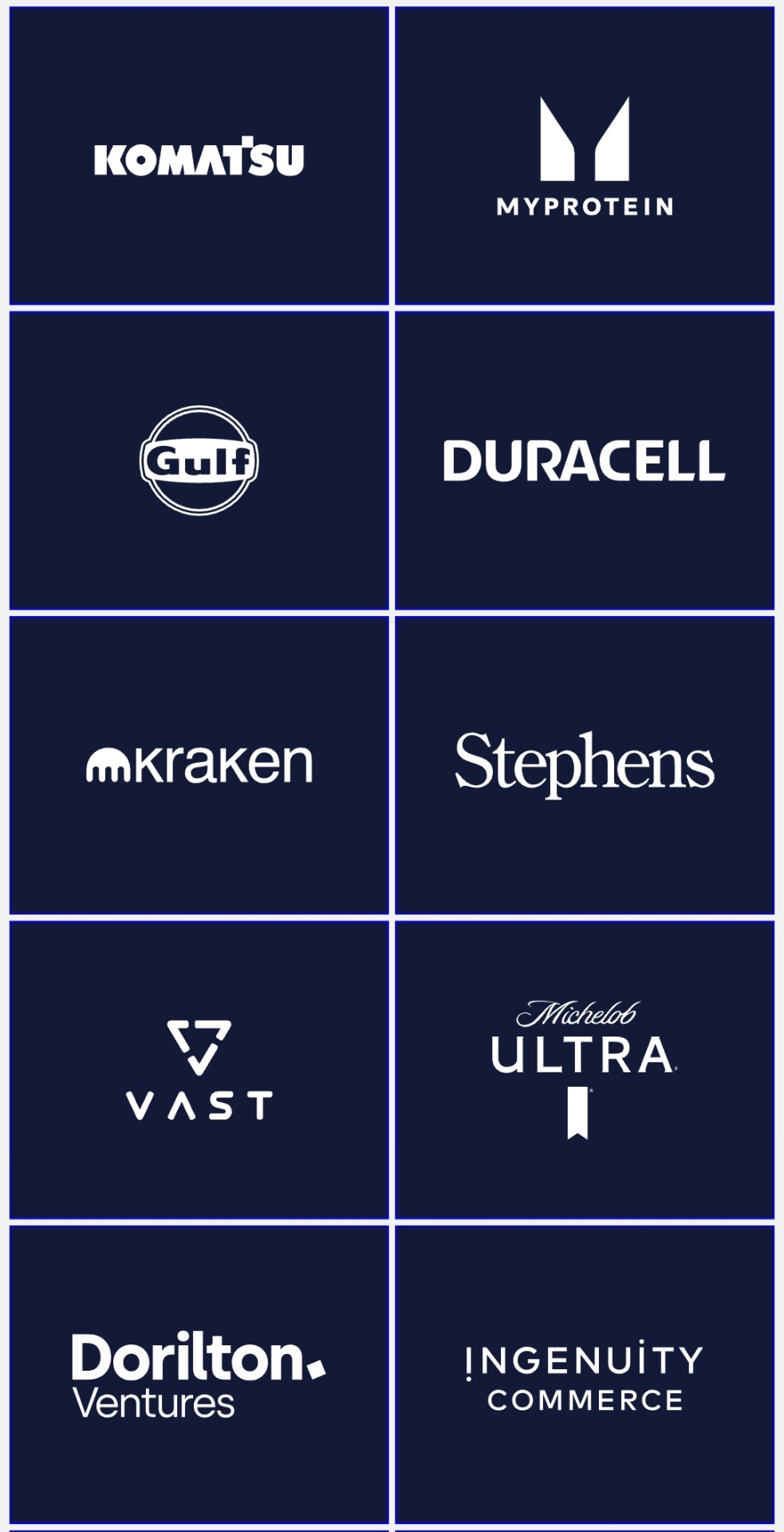
New sponsors: Komatsu, MyProtein (British bodybuilding supplement), Kraken (American crypto company, joined later in 2023), VAST Data (American tech company), Ingenuity Commerce (UK e-commerce platform), Puma (joined later in 2023)
Old sponsors that left: Acronis (Swiss software company), Bremont (British watch manufacturer), Dtex Systems (American? cybersecurity company), Financial Times (British business newspaper), Jumeirah Hotels & Resorts, KX (UK software company), OMP (Italian racing safety equipment manufacturer), PPG (American painting manufacturer), Umbro (English sports equipment manufacturer), Zeiss (German opticals/optometrics manufacturing company)
#mercedes amg petronas#red bull racing#scuderia ferrari#visa cash app rb#haas f1 team#mclaren f1#aston martin#alpine f1#williams racing#stake f1 team#f1#ari's rant#sponsor talks
42 notes
·
View notes
Text
What are the pros and cons of ITIL and ServiceNow ITSM?
ServiceNow ITSM Implementation Services

ITIL is a widely and commonly accepted framework used for managing IT services and ServiceNow ITSM is a majorly leveraged platform that brings these best practices to life with its implementation. They help businesses to deliver more reliable, efficient and user-focused IT support with its adaptation. However, like any system, there are benefits and challenges to consider.
Pros -
Organized IT Process:
ITIL assists and grants a clear structure for managing IT services, while ServiceNow ITSM aids the teams to follow a standard operating through structure with automated workflows. As the initiative assures that the frequency of consistency and lowered errors, makes the process easier to handle daily operations with its smooth implementations into the system.
Faster Response & Quick Resolution:
ServiceNow ITSM automates the tasks i.e. ticket creation, assignment, and status updates with its leveraging into the system. This speeds up how fast the IT teams and working professionals respond to raised concern and resolve the issue by improving the service quality of the deliverables.
Self-Service and User Empowerment:
As the users can access for help through self-service portals and knowledge bases without needing to contact IT teams directly or reach-out the assistance window. This lowers the number of support requests and gives users quicker solutions.
Performance Tracking and Insights:
With the assistance of real-time dashboards and data analytics reports, the IT managers and senior officials can monitor their activity and, track the service trends, and identify areas for improvement. This data-driven approach leads to better planning and resource management.
Alignment with Industry Standards:
ServiceNow ITSM supports ITIL out of the box ideas as it assure businesses can easily adopt and get globally recognized with the standard practices that are set as per business standards. This all improves the compliance process and service for overall consistency across the working professionals.
Cons -
Complex Implementation:
Setting up ITIL processes and systems on ServiceNow requires proper planning and technical knowledge without it may get stuck up or entitled up and leads towards a system mess. Without prior guidance or experience, implementation can become a massive crushing stone for the organization.
High Costs:
Sometimes, the licensing fees and setup costs with customizations can be expensive or costly, especially for small or mid-sized companies and organizations. With the constant ongoing support and training add a loop or hole to the investment of the business and set up as a major drawback for the company..
User Adoption Challenges:
Switching between multiple or into a new system may face resistance from employees who are used to older methods. At the same time, the improper onboarding session and training might seem essential for a smooth transition but might get tangled up.
ServiceNow ITSM boosts IT efficiency, streamlines processes, and increases service delivery. With expert guidance from providers like Suma Soft, INRY, Fidel Technologies, and Glidefast, businesses can maximize their benefits while overcoming challenges.
#it services#technology#software#saas#saas development company#digital transformation#saas technology
2 notes
·
View notes
Text
How-To IT
Topic: Core areas of IT
1. Hardware
• Computers (Desktops, Laptops, Workstations)
• Servers and Data Centers
• Networking Devices (Routers, Switches, Modems)
• Storage Devices (HDDs, SSDs, NAS)
• Peripheral Devices (Printers, Scanners, Monitors)
2. Software
• Operating Systems (Windows, Linux, macOS)
• Application Software (Office Suites, ERP, CRM)
• Development Software (IDEs, Code Libraries, APIs)
• Middleware (Integration Tools)
• Security Software (Antivirus, Firewalls, SIEM)
3. Networking and Telecommunications
• LAN/WAN Infrastructure
• Wireless Networking (Wi-Fi, 5G)
• VPNs (Virtual Private Networks)
• Communication Systems (VoIP, Email Servers)
• Internet Services
4. Data Management
• Databases (SQL, NoSQL)
• Data Warehousing
• Big Data Technologies (Hadoop, Spark)
• Backup and Recovery Systems
• Data Integration Tools
5. Cybersecurity
• Network Security
• Endpoint Protection
• Identity and Access Management (IAM)
• Threat Detection and Incident Response
• Encryption and Data Privacy
6. Software Development
• Front-End Development (UI/UX Design)
• Back-End Development
• DevOps and CI/CD Pipelines
• Mobile App Development
• Cloud-Native Development
7. Cloud Computing
• Infrastructure as a Service (IaaS)
• Platform as a Service (PaaS)
• Software as a Service (SaaS)
• Serverless Computing
• Cloud Storage and Management
8. IT Support and Services
• Help Desk Support
• IT Service Management (ITSM)
• System Administration
• Hardware and Software Troubleshooting
• End-User Training
9. Artificial Intelligence and Machine Learning
• AI Algorithms and Frameworks
• Natural Language Processing (NLP)
• Computer Vision
• Robotics
• Predictive Analytics
10. Business Intelligence and Analytics
• Reporting Tools (Tableau, Power BI)
• Data Visualization
• Business Analytics Platforms
• Predictive Modeling
11. Internet of Things (IoT)
• IoT Devices and Sensors
• IoT Platforms
• Edge Computing
• Smart Systems (Homes, Cities, Vehicles)
12. Enterprise Systems
• Enterprise Resource Planning (ERP)
• Customer Relationship Management (CRM)
• Human Resource Management Systems (HRMS)
• Supply Chain Management Systems
13. IT Governance and Compliance
• ITIL (Information Technology Infrastructure Library)
• COBIT (Control Objectives for Information Technologies)
• ISO/IEC Standards
• Regulatory Compliance (GDPR, HIPAA, SOX)
14. Emerging Technologies
• Blockchain
• Quantum Computing
• Augmented Reality (AR) and Virtual Reality (VR)
• 3D Printing
• Digital Twins
15. IT Project Management
• Agile, Scrum, and Kanban
• Waterfall Methodology
• Resource Allocation
• Risk Management
16. IT Infrastructure
• Data Centers
• Virtualization (VMware, Hyper-V)
• Disaster Recovery Planning
• Load Balancing
17. IT Education and Certifications
• Vendor Certifications (Microsoft, Cisco, AWS)
• Training and Development Programs
• Online Learning Platforms
18. IT Operations and Monitoring
• Performance Monitoring (APM, Network Monitoring)
• IT Asset Management
• Event and Incident Management
19. Software Testing
• Manual Testing: Human testers evaluate software by executing test cases without using automation tools.
• Automated Testing: Use of testing tools (e.g., Selenium, JUnit) to run automated scripts and check software behavior.
• Functional Testing: Validating that the software performs its intended functions.
• Non-Functional Testing: Assessing non-functional aspects such as performance, usability, and security.
• Unit Testing: Testing individual components or units of code for correctness.
• Integration Testing: Ensuring that different modules or systems work together as expected.
• System Testing: Verifying the complete software system’s behavior against requirements.
• Acceptance Testing: Conducting tests to confirm that the software meets business requirements (including UAT - User Acceptance Testing).
• Regression Testing: Ensuring that new changes or features do not negatively affect existing functionalities.
• Performance Testing: Testing software performance under various conditions (load, stress, scalability).
• Security Testing: Identifying vulnerabilities and assessing the software’s ability to protect data.
• Compatibility Testing: Ensuring the software works on different operating systems, browsers, or devices.
• Continuous Testing: Integrating testing into the development lifecycle to provide quick feedback and minimize bugs.
• Test Automation Frameworks: Tools and structures used to automate testing processes (e.g., TestNG, Appium).
19. VoIP (Voice over IP)
VoIP Protocols & Standards
• SIP (Session Initiation Protocol)
• H.323
• RTP (Real-Time Transport Protocol)
• MGCP (Media Gateway Control Protocol)
VoIP Hardware
• IP Phones (Desk Phones, Mobile Clients)
• VoIP Gateways
• Analog Telephone Adapters (ATAs)
• VoIP Servers
• Network Switches/ Routers for VoIP
VoIP Software
• Softphones (e.g., Zoiper, X-Lite)
• PBX (Private Branch Exchange) Systems
• VoIP Management Software
• Call Center Solutions (e.g., Asterisk, 3CX)
VoIP Network Infrastructure
• Quality of Service (QoS) Configuration
• VPNs (Virtual Private Networks) for VoIP
• VoIP Traffic Shaping & Bandwidth Management
• Firewall and Security Configurations for VoIP
• Network Monitoring & Optimization Tools
VoIP Security
• Encryption (SRTP, TLS)
• Authentication and Authorization
• Firewall & Intrusion Detection Systems
• VoIP Fraud DetectionVoIP Providers
• Hosted VoIP Services (e.g., RingCentral, Vonage)
• SIP Trunking Providers
• PBX Hosting & Managed Services
VoIP Quality and Testing
• Call Quality Monitoring
• Latency, Jitter, and Packet Loss Testing
• VoIP Performance Metrics and Reporting Tools
• User Acceptance Testing (UAT) for VoIP Systems
Integration with Other Systems
• CRM Integration (e.g., Salesforce with VoIP)
• Unified Communications (UC) Solutions
• Contact Center Integration
• Email, Chat, and Video Communication Integration
2 notes
·
View notes